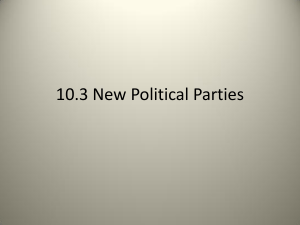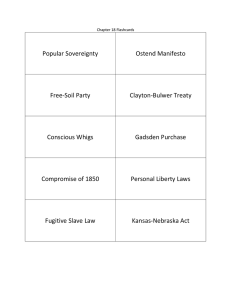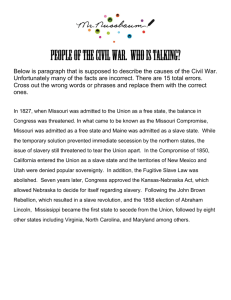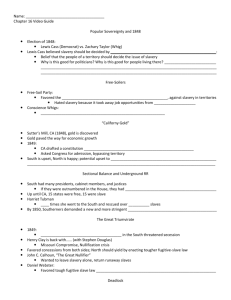ANTEBELLUM PREVIEW Slavery - a civil relationship whereby one
advertisement
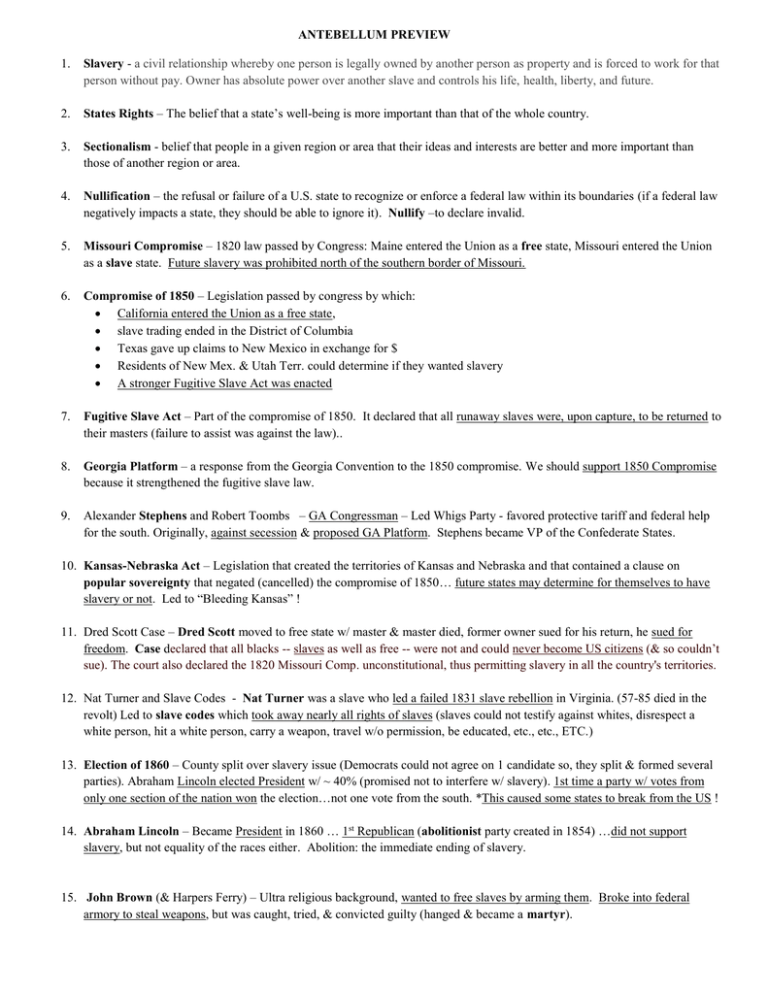
ANTEBELLUM PREVIEW 1. Slavery - a civil relationship whereby one person is legally owned by another person as property and is forced to work for that person without pay. Owner has absolute power over another slave and controls his life, health, liberty, and future. 2. States Rights – The belief that a state’s well-being is more important than that of the whole country. 3. Sectionalism - belief that people in a given region or area that their ideas and interests are better and more important than those of another region or area. 4. Nullification – the refusal or failure of a U.S. state to recognize or enforce a federal law within its boundaries (if a federal law negatively impacts a state, they should be able to ignore it). Nullify –to declare invalid. 5. Missouri Compromise – 1820 law passed by Congress: Maine entered the Union as a free state, Missouri entered the Union as a slave state. Future slavery was prohibited north of the southern border of Missouri. 6. Compromise of 1850 – Legislation passed by congress by which: California entered the Union as a free state, slave trading ended in the District of Columbia Texas gave up claims to New Mexico in exchange for $ Residents of New Mex. & Utah Terr. could determine if they wanted slavery A stronger Fugitive Slave Act was enacted 7. Fugitive Slave Act – Part of the compromise of 1850. It declared that all runaway slaves were, upon capture, to be returned to their masters (failure to assist was against the law).. 8. Georgia Platform – a response from the Georgia Convention to the 1850 compromise. We should support 1850 Compromise because it strengthened the fugitive slave law. 9. Alexander Stephens and Robert Toombs – GA Congressman – Led Whigs Party - favored protective tariff and federal help for the south. Originally, against secession & proposed GA Platform. Stephens became VP of the Confederate States. 10. Kansas-Nebraska Act – Legislation that created the territories of Kansas and Nebraska and that contained a clause on popular sovereignty that negated (cancelled) the compromise of 1850… future states may determine for themselves to have slavery or not. Led to “Bleeding Kansas” ! 11. Dred Scott Case – Dred Scott moved to free state w/ master & master died, former owner sued for his return, he sued for freedom. Case declared that all blacks -- slaves as well as free -- were not and could never become US citizens (& so couldn’t sue). The court also declared the 1820 Missouri Comp. unconstitutional, thus permitting slavery in all the country's territories. 12. Nat Turner and Slave Codes - Nat Turner was a slave who led a failed 1831 slave rebellion in Virginia. (57-85 died in the revolt) Led to slave codes which took away nearly all rights of slaves (slaves could not testify against whites, disrespect a white person, hit a white person, carry a weapon, travel w/o permission, be educated, etc., etc., ETC.) 13. Election of 1860 – County split over slavery issue (Democrats could not agree on 1 candidate so, they split & formed several parties). Abraham Lincoln elected President w/ ~ 40% (promised not to interfere w/ slavery). 1st time a party w/ votes from only one section of the nation won the election…not one vote from the south. *This caused some states to break from the US ! 14. Abraham Lincoln – Became President in 1860 … 1st Republican (abolitionist party created in 1854) …did not support slavery, but not equality of the races either. Abolition: the immediate ending of slavery. 15. John Brown (& Harpers Ferry) – Ultra religious background, wanted to free slaves by arming them. Broke into federal armory to steal weapons, but was caught, tried, & convicted guilty (hanged & became a martyr).

